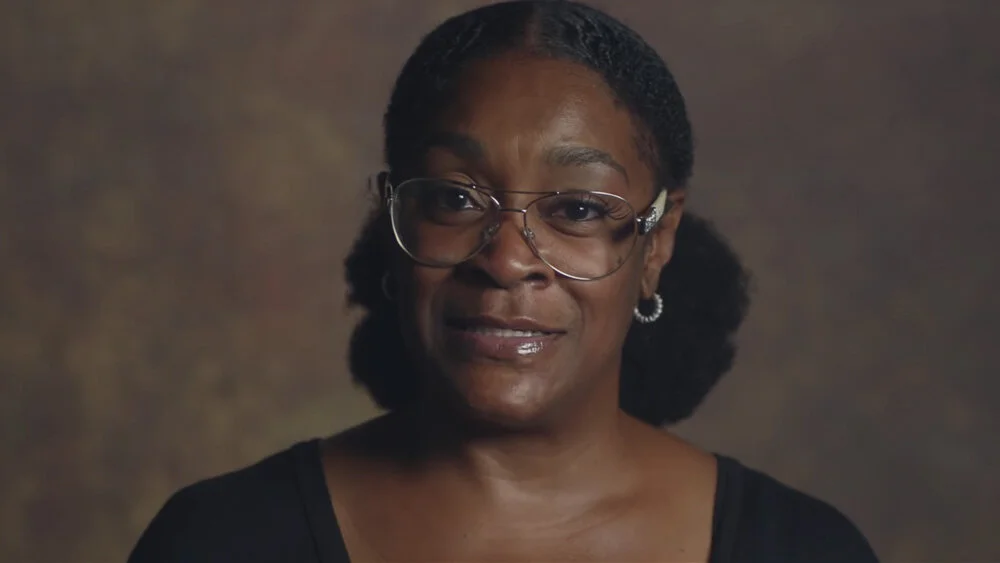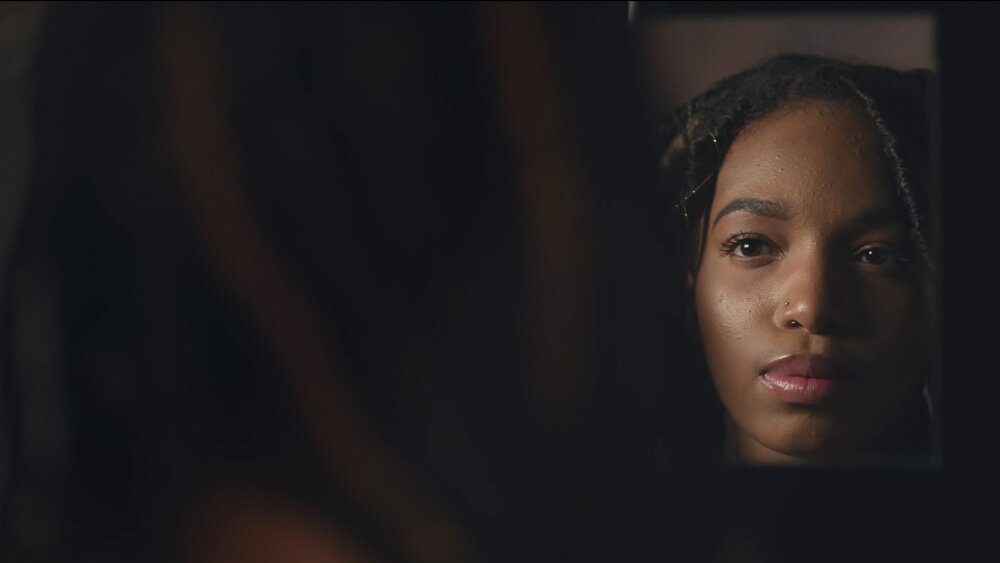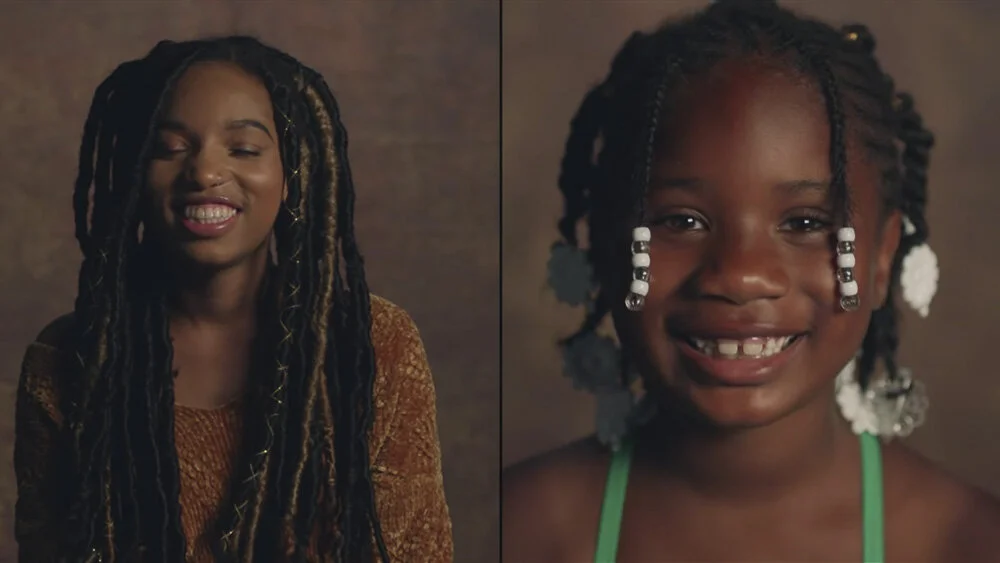(In)Visible Portraits – More Visible Than Ever
Oge Egbuonu © Ryan Eng
The radiant and inspiring Oge Egbuonu, director of the newly released film (In)visible Portraits, is changing the way the industry thinks of storytelling by creating rich narratives that reeducate, uplift, and deeply touch its audience. Her film was released about a month ago on Saturday June 19th, also known as Juneteenth. and is now available for streaming on Vimeo. (In)visible Portraits is a story of personal growth, a critique of our society, an ode to black womanhood, and a call to action—all in one 90 minute love letter. Musée was lucky enough to speak with Oge over the phone—the COVID version of a coffee-shop interview—and chat about her labor of love.
Alessandra Schade: Your film, (In)visible Portraits, has been three years in the making. I can only imagine that, in the black community and for black women, this project has never been less or more timely. But, for the American mainstream media, given the short attention span that it seems to have, this project debuts in a really special moment in American consciousness. With the violently unjust murders of George Floyd and Breonna Taylor, the outcry is literally audible—I can hear the protests happening from every corner of the city. I'm wondering what your thoughts are about the sociopolitical moment in which your project is being introduced.
Oge Egbuonu: The moment that we're in is definitely unprecedented in so many ways. But then there also is a familiarity. The killings of black folks and brown folks has been a constant in this country for centuries. That isn't anything new. But during this time, we’ve been given time to reflect. This pandemic has laid the foundation for that [reflection] to happen. And in doing so, you get the results of the huge outcries, you get the results of this uprising and protesting. So yes, it couldn't have come at a more timely moment. We're in this space of collective relearning. And one thing that this film does, is give a glimpse into the true history of America, in the way that black women have consistently been erased in this country and mistreated.
(In)Visible Portraits, 2020
(In)Visible Portraits, 2020
Alessandra: When you set out to make this film, what was your original vision and did that change during the production time of this film?
Oge: My initial vision was completely different from what you see in the documentary. My initial vision came from a space of me not knowing enough, me not being as educated as I am now. So the vision has completely morphed and changed as I did about eight months of research. When I initially pitched the idea to my investor, it was very much, "Oh, let's discuss the matriarchy versus patriarchy view and how that oppression affects black women." But as I started to do the research, and as I started to sit with the stories that I was reading, sit with the knowledge that I was learning, it literally transformed into what you see today. I allowed myself to become an open vessel, to be a voice for the voiceless – a voice for these women who are no longer with us, who I consider to be my ancestors, even though I've never met them. I had to step out of myself and I had to get out of the way and allow this film to share their voices.
Alessandra: There's so much joy in your film alongside the visceral pain of a group that's been marginalized, otherized and physically and metaphorically beaten down in this country. Is there a reason that you decided to directly focus on the beauty and love and joys of black womanhood?
Oge: There's no way you can discuss black womanhood without discussing the joy of black womanhood. It would be doing a disservice to black womanhood to only discuss the resiliency and the pain and the hurt that we've been through. For me, it was capturing black womanhood in its entirety, which encompasses all these things. Even in this current moment it’s important to discuss how we’re also cultivating joy. How we also are cultivating restorative care and healing care in this moment.
(In)Visible Portraits, 2020
Alessandra: You’ve said previously that you focus on “disruptive inspiration storytelling.” Can you explain a little bit about your work why you would call it “disruptive?”
Oge: We've been conditioned to think [certain things] are normal or true. When I say “disruptive storytelling,” it's mainly about investigating the truth. It's questioning everything that I've been told, and actually doing the research to figure out if it is true or if there are alternatives. One of the most powerful mediums that we have, is the medium of storytelling. We live in a world that is built of social constructs. Someone imagined slavery, which is why it came to be true; enough people believed that to be true. So if we can get enough people to reimagine a different world, just think about how powerful that would be. My storytelling is a tool to empower people to do just that—to tap into their most powerful currency, which is their imagination and just reimagine a world that's different.
You mentioned the role of social constructs in your process. Historically, do you find that the film industry participated in perpetuating these harmful social constructs?
Oge: It all goes back to being conscious and aware of the things that we are creating. The industry, for the most part, is a game of celebrity—of fame and popularity. And it's not really understanding the responsibility that we have in these positions. You have a responsibility when you've been given a platform to voice a story, to be the voice of a certain community. Stories create magic and it's a sense of wonder at the world, right? It teaches us about life, it teaches us about ourselves and about others. And so when you understand that, you have a duty to be aware of the content that you're creating. And Hollywood misses the mark on that. I'm also quite hopeful that the people that we have stepping into these roles as storytellers, like myself, are a lot more conscious and aware in the stories that we create and produce.
(In)Visible Portraits, 2020
I think you’ve succeeded in sparking hope for our future generation in your film. In filmmaking specifically, what do you think the next steps are to effect change within the industry?
Oge: In order to create change in the industry—it's simple, really—It's just self reflection. It's people independently doing the work to investigate how they're showing up in the world. Because you can attend as many protests as you want, you can sign as many petitions as you want, and you can create as many diversity committee boards as you want, but perhaps the change still hasn't reflected the intention. So it's really about just actually doing the work, the independent self-work. Asking yourself the tough questions. Like, how am I choosing to show up in this space? I'm hopeful because this younger generation, my generation and younger, are the field of people who actually are doing the work.
Can you tell me about some of the feedback you're getting back from the public? Are you finding that the project resonates more with black women who are feeling seen and uplifted or with a white audience that are feeling informed and enlightened—perhaps a mixture of both?
Oge: The feedback has been a mixture of both because, first and foremost, the film is a love letter to black women. But then secondly, it's a re-education. And I think with me setting that intention and going into making it, it's been received as such. So I equally get emails from black women and black girls saying, "Oh my God, this is the first time I've actually been able to articulate what I felt my entire life,” or, "this is the first time I felt seen and validated." But I also get emails and DMs from black men and white women and white men, saying, "I didn't realize how I perpetuated this particular form of oppression,” or, "I'm going to do better. I'm going to show up better."
(In)Visible Portraits, 2020
(In)Visible Portraits is available on Vimeo.












